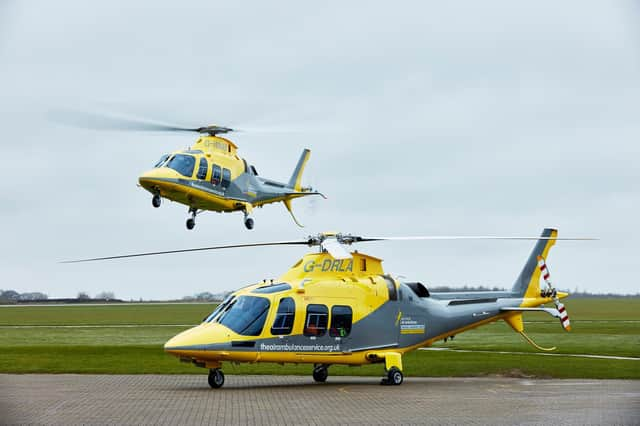Air ambulance helicopters on constant alert in Harborough are to start carrying lifesaving supplies of blood and plasma for the first time


Air ambulance helicopters on constant alert in Harborough are to start carrying lifesaving supplies of blood and plasma for the first time.
Blood and plasma to help treat and save seriously injured or ill patients will also be carried by critical care cars.
Advertisement
Advertisement
The Air Ambulance Service races to help victims of major trauma - some of which suffer catastrophic bleeding – in Leicestershire and across the East Midlands every day.
Its highly-trained medical crews will now be able to give prehospital emergency blood transfusions to patients who have life-threatening bleeding from medical conditions to terrible injuries.
Injuries are usually suffered through road crashes or knife attacks, said the service.
“With road traffic collisions making up most of the incidents TAAS (The Air Ambulance Service) has attended over the past 19 years, and with the increase of knife crime throughout its counties, this onboarding of blood and plasma further enhances the vital care provided to the service’s patients.
Advertisement
Advertisement
“For the bleeding patient, blood transfusion is one part of a package of critical care that is provided by our teams to bring advanced resuscitation earlier in the patient’s care before they arrive at hospital, giving them the best chance of survival,” said service Deputy Clinical Lead and University Hospital Coventry and Warwickshire (UHCW) Consultant Dr Caroline Leech.
“With data from UHCW showing that two thirds of their major trauma patients who required emergency blood transfusion were treated and transported by TAAS, it has shown there may be a potential benefit in bringing blood to the patient earlier.
“All our doctors and critical care paramedics have received comprehensive training alongside enhanced procedures to be able to deliver the intervention efficiently at scene,” added Dr Leech.
The ground-breaking new initiative has taken 18 months to come together.
Advertisement
Advertisement
It’s being backed by Leicestershire & Rutland Blood Bikes, University Hospital Coventry & Warwickshire NHS Trust blood transfusion laboratory, Nottingham University Hospital blood transfusion laboratory and Warwickshire & Solihull Blood Bikes.
NUH Charity, Nottingham University Hospitals have also donated a generous grant to help the charity fund a blood fridge and blood plasma freezer at their hospital site.
“We are extremely pleased to have funded this blood fridge and blood plasma freezer to enable the storage of vital blood products for patients being treated by The Air Ambulance Service,” said Barbara Cathcart, Chief Executive of Nottingham Hospitals Charity.
“We hope that this will enable patients suffering from heavy blood loss to be treated as soon as possible, before their arrival at hospital, giving them the best possible chance of recovery.
Advertisement
Advertisement
“This donation was made possible thanks to our generous donors from across the Midlands.”
Richard Clayton, the Air Ambulance Service’s Director of Operations, said: “The introduction of prehospital blood transfusions is another positive development in the Air Ambulance Service’s absolute commitment to support the most critically ill and injured patients it has proudly served for nearly 19 years.
“I am extremely grateful to everyone that has been involved in the project.”
The Air Ambulance Service is not government funded and relies on public donations to remain operational and to make medical developments such as this.
Anyone wishing to find out more about the lifesaving work of the charity can call 0300 3045 999 or visit www.theairambulanceservice.org.uk